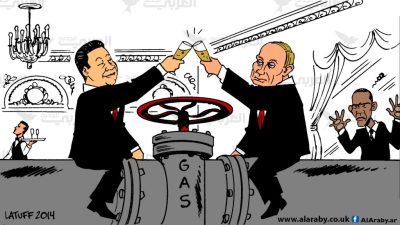The Russia-China Strategic Gas Agreement. 1,800km Sakhalin-Vladivostok Pipeline

All Global Research articles can be read in 51 languages by activating the “Translate Website” drop down menu on the top banner of our home page (Desktop version).
To receive Global Research’s Daily Newsletter (selected articles), click here.
Visit and follow us on Instagram, Twitter and Facebook. Feel free to repost and share widely Global Research articles.
***
On February 4, Russia and China signed a new contract to supply gas to China. During Russian President Vladimir Putin’s visit to China, Gazprom and CNPC signed a new 25-year contract to supply 10 billion cubic meters of gas from the Russian Far East to China. This initiative falls within the framework of the political aspect. On February 4, Russia and China also concluded a joint statement of Russia and China on international relations, entering a new era, and global governance.
The new initiative has been nurtured for more than 6 years. In 2015, a memorandum on the project was signed, in 2017, there was an agreement on the basic conditions of supply, including volume of supplies, contract duration, the start of supplies, period of volume build-up, border crossing point. The project differs from the Power of Siberia initiative, according to which after the contract is signed, the pipeline is built and the equipment is set up.
The gas pipeline involved in the new initiative is called Sakhalin-Khabarovsk-Vladivostok. Talking about the details, its length is 1,800 km. It has already been expanded on a 353-kilometer section from Komsomolsk-on-Amur to Khabarovsk. It is planned to increase its capacity with through the compression stations. A 25-kilometer section from the main branch between Khabarovsk and Vladivostok will also be built. On top of that, a main gas pipeline branch, a gas metering station, natural gas preparation equipment for transportation and gas purification and dehydration facilities will be built.
Currently, Gazprom is developing the Kirinskoye and Yuzhno-Kirinskoye fields. At the Kirinskoye field gas production began in 2014, according to the project plan, 5.5 billion cubic meters should be used 1.2 billion cubic meters were used. 7 more wells were recently built, so the rate of gas production will be increased. The Yuzhno-Kirinskoye field was discovered in 2010, but will not be in action until 2023. The total gas reserves of this field are 611.7 billion cubic meters; 22 wells have already been constructed; 21 billion cubic meters of gas will be produced per year.
The new contract is not the largest gas contract between Russia and China. For example, the Power of Siberia provides 38 billion cubic meters per year, the Power of Siberia 2 provides 50 billion cubic meters. The new initiative is only an addition to Russia’s main supplies to the PRC. Thus, in 2018, Gazprom delivered 242 billion cubic meters of gas to China, including liquefied natural gas.
The pipeline borders Heilongjiang province and stretches to Beijing. This project is important for China, as it acts as a more profitable alternative to liquefied natural gas. Liquefied natural gas is supplied to China by Indonesia, the United States, Malaysia and Qatar.
In 2021, China’s gas imports amounted to 160 billion cubic meters. Now China is in an active stage of switching production from coal to gas, which is being successfully implemented. China is now moving into the leading position in the world in terms of imports of liquefied natural gas. As part of the 14th Five-Year Plan, the goal was to switch to a low-carbon and green economy and limit emissions, so the government is actively developing the gas sector.
Bloomberg, citing its sources, previously reported on negotiations between Chinese importers of LNG, including Sinopec and PetroChina, on the purchase of gas from Russia at reduced prices. According to the agency, importers are considering using Russian companies to participate in tenders for the purchase of LNG on their behalf in order to hide these transactions from foreign countries.
On April 6, Reuters reported, citing six anonymous sources, that Chinese state-owned companies retain existing contracts for oil supplies from Russia, but refrain from concluding new ones amid Beijing’s cautious position in connection with Western sanctions against Moscow. State-owned Chinese energy companies PetroChina, Sinopec, Sinopec and CNOOC reportedly decided not to bid for Russian oil supplies in May. They do not want the purchase of additional volumes of oil to look like support for Russia, two sources said.
Earlier, Zhao Lijian, a spokesman for the Chinese Foreign Ministry claimed that the Chinese government will take drastic measures in case the US and other Western countries put pressure on Chinese companies because of anti-Russian sanctions. Mr. Lijian reiterated China’s official position on the rejection of any unilateral sanctions. According to him, the restrictions will cause serious difficulties for the economy and living conditions of people in the countries concerned, which will lead to a situation where both sides lose out, which will further exacerbate the division and confrontation.
The new initiative between Russia and China will complement the existing cooperation between the two countries in the gas industry, bring additional benefits to both sides, and provide new jobs for workers in the two countries.
*
Note to readers: Please click the share buttons above or below. Follow us on Instagram, Twitter and Facebook. Feel free to repost and share widely Global Research articles.
SUPPORT SOUTHFRONT:
PayPal: [email protected], http://southfront.org/donate/ or via: https://www.patreon.com/southfront

